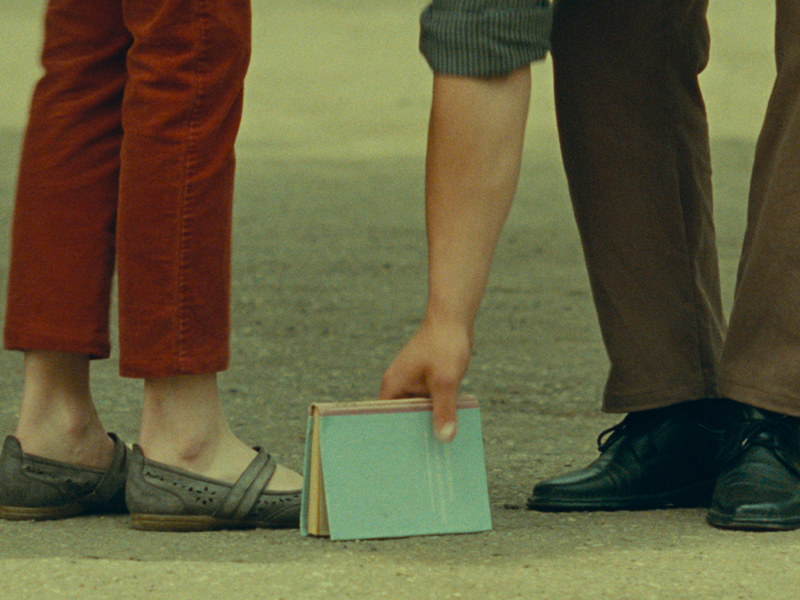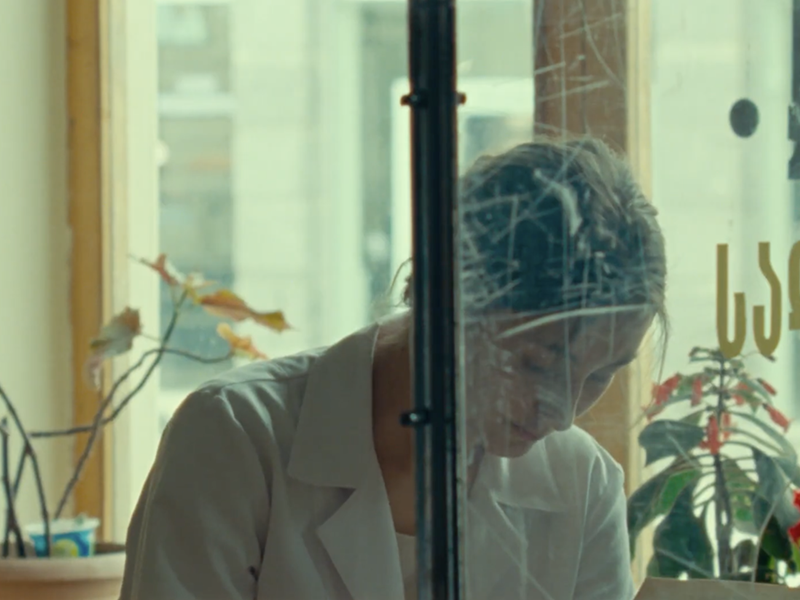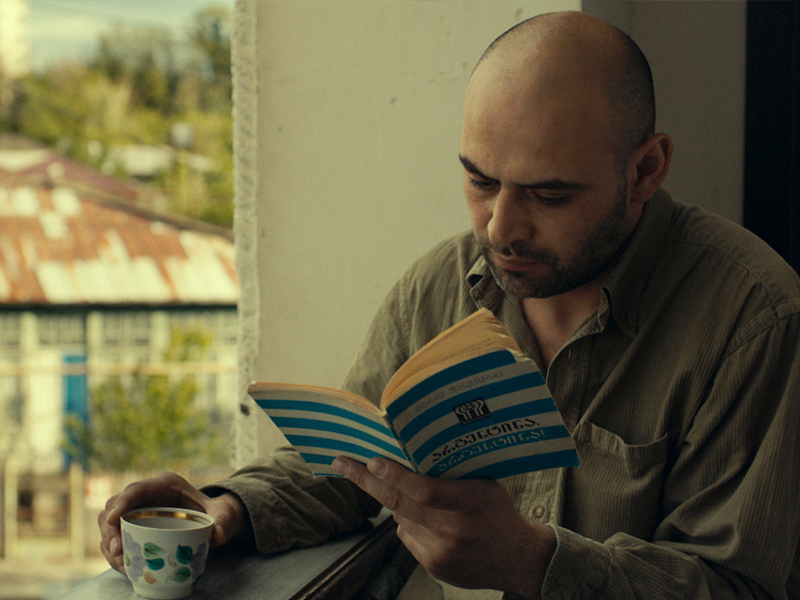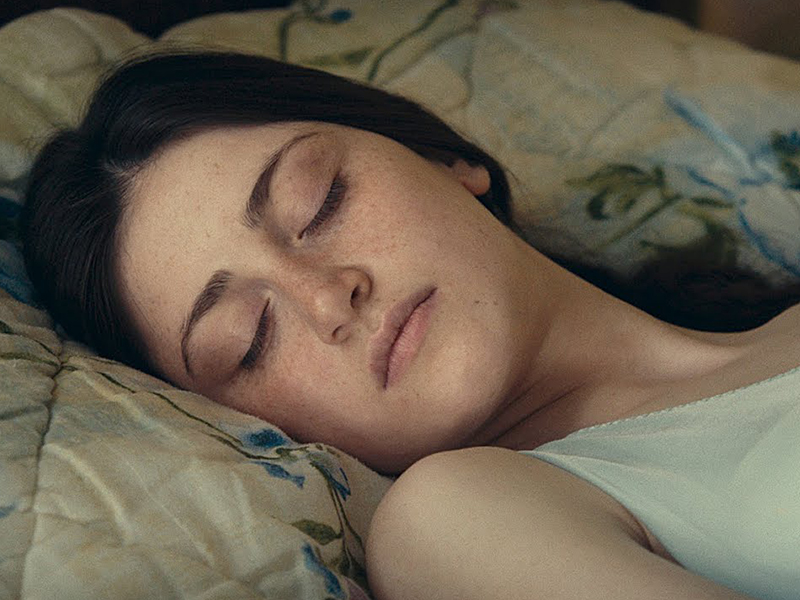TIFF.20 – Alexandre Koberidze: “If miracles can happen, the other can happen too”
A boy and a girl meet on the street, no clues about the time they live in – only their legs can be seen entering the shot; a book falls on the ground, one of them bends down to pick it up; the scene keeps repeating. After this series of coincidences, they both decide to meet the next day; they go on their separate ways, crossing the tracks. At no point does the director Alexandre Koberidze get too close in these scenes, and the dialogue is seen through either extreme close-ups or wide shots (an establishing shot of the shining city lights). Any doubt about the counterintuitive way in which this Bressonian encounter is constructed (others would have relied on close-ups or at least a type of shot that would have revealed their faces) soon dissipates, when the protagonist is disturbed in her path by a twig, a pipe, a lantern, all announcing that she and the young boy have been touched by a curse. For them not to recognize each other again, Giorgi and Lisa’s faces will change overnight, and their talents (she was a dedicated pharmacist, he was a football player) will also vanish. The fairy tale imagined in What Do We See When We Look at the Sky has nothing surreal about it; the heralds of the curse are actually objects in Lisa’s vicinity, which come to life only through voice-over. After the “transfiguration”, the two quickly get over the reality reflecting in the mirror and continue untroubled with their lives. As in any fairy tale, things are in plain sight, but the curse can’t be removed – the tragedy is that every day they see each other from a distance and even exchange words without any of them recognizing each other.

What Do We See When We Look at the Sky is the second film by Georgian director Alexandre Koberidze (the first, dedicated to the city of Tbilisi, Let the Summer Never Come Again, was shot with the phone) and is his graduation project from the German Film and Television Academy Berlin, the prestigious university that gave filmmakers such as Angela Schanelec, Christian Petzold, and Julian Radlmaier. The movement was later coagulated under the name “Berlin Film School”. Koberidze worked a lot with Radlmaier, he starred in his films (in A Proletarian Winter’s Tale and Self-Criticism of a Bourgeois Dog). The observation is necessary – not only does it make Koberidze very anchored in what is happening with the Berlin school, but also interested in its so-called agenda (films about cities, in this case, films that contain the essence of cities like butterflies caught in a jar). In his new film, Koberidze takes this idea to a very refined level – after spending a year in Kutaisi with the film’s cinematographer, Faraz Fesharaki, he decided to make a docu-fiction with a fairytale element, to sweeten the surrounding reality (not only the love story and the curse, but also a secondary fairy tale, related to the secret life of the quadrupeds and their multiple paths), but not to alter it.
Probably the most sophisticated bit in What Do We See When We Look at the Sky is a slow-motion scene depicting a football game, where Koberidze only intervened in terms of editing; he put the camera on the kids (all wearing T-shirts with Messi’s number) and left them to do their own thing. In the end, after we enjoy a series of mirroring details, one of the boys strucks out and the ball falls in the riverbed.
I tried to get more details about the docu-fictional dynamics in the film. He tells me that all the things we see are essentially true, that they are things that he caught on the camera on the spot, but there are also things he reproduced from memories. We met on the hottest day of the festival and held the interview at a table (thus avoiding the notorious sofa for interviews). I ask him what other movies he’s seen during his time at the festival and he immediately answers Rohmer.

Your film feels like a reminder of a bygone era; in some rural areas, time is slowed down, pausing the mundane to experience the little joys: watching the sun setting, a dog passing-by. Tell me more about the connection between the silent film aesthetic and a city so grounded, rooted as Kutaisi?
Yes, generally, one of the first ideas was to make a sort of silent film, and this knowledge guided me then all the time. In writing and making storyboards, during shooting, but also editing – in moments when I felt frustrated, I remembered it and always gave me new ideas. And about time – yes, I think every director who at least is interesting for me proposes new ways of experiencing time. After leaving the cinema, after seeing Éric Rohmer or David Lynch, you have completely different experiences of time and that stays with you somehow. That’s one of the biggest powers of cinema. Most of the people are unsatisfied with how we deal with time today. On one hand, I tried to think about how it was in times before, but also fantasize about how it might be in the future.
There’s also the magic realism, the sudden implosion of magic that surely reminds us to let go of logical explanations – it goes all the way back to Georges Méliès, but also Lumière brothers. The beginning of your film has a hint of “workers leaving the factory”. Were there other overt influences when shaping the story?
Sure, this beginning is somewhat reminiscent of “Children leaving the school”, as I named it. For me, when I think about things I want to do, I’m always quite dependent on the films I’ve seen; it’s one of the places I go to and which motivates me to make films. When I see something, then I also want to make something like that. But mostly I’m motivated by a good feeling – it doesn’t happen with bad films, of course – there are many directors who give me energy to work and affect me easily in a way that I try to take bits from the things I like. Recently I’ve seen the last film of Orson Welles, The Other Side of the Wind, with John Huston and Bogdanovich, and people accuse Bogdanovich that he stole from Huston; he replies “you can steal from everyone, just not from yourself”, I’m not a big fan of quotes, but this one is really good.
Have you “stolen” something in particular?
Yes, there are a few small things from Otar Iosseliani’s films, Nanni Moretti, Kiarostami (laughs); we have quite the exact scene from an iranian film called Uncle Moustache –
There’s also Hong Sang-so – in the musical interludes, the zoom-ins…
Me and the cameraman are both fans of him and we’ve watched all of his films, yes.

Why a pharmacist and a football player?
For the pharmacist, there are a few answers – there’s this beautiful pharmacy shop in Kutaisi, where we wanted to shoot (laughs), but also a pessimistic poem which I read and it’s about how a pharmacy is one of the basic things in a town; there’s a pharmacy and a bar and some lights.
But football is an important thing for Kutaisi or it’s something you came up with?
Yes, for Kutaisi is quite important, and it’s always been, but for me also; I watch football, I play football and it’s a big passion for me. Today, there’s a huge excitement around sports and sometimes even small “miracles” can happen, which I don’t experience or experience less in other fields. And yes, when I make a film, I try to find the things I am passionate about, to share them with others; this time especially, with the World Cup, I was very passionate about it.
But why Argentina and this titanic figure of Messi surrounding the city? Is it fictional?
It was me and my main actors’ wish that Leo Messi would win the World Cup; for many years, we kind of followed him and we are both fans of him. This time, the idea was somehow to watch him win, in our own reality (because in 2018 we thought there was a good chance), and if not, to make a film about how he does it (laughs).
I’m curious about this narrator, who is obviously your persona – he’s clearly quirky, engaging the audience, but he’s not omniscient or omnipotent – he can’t break the love curse, for instance. Is this how you also see cinema in general as an author? As an observation on life?
I think it’s more than that – because, as we spoke about time, you leave the cinema after a Fassbinder and the world is different, sometimes it stays with you forever. I completely understand that it doesn’t have a huge social impact on everyday life; especially today, it doesn’t have that much power as it had in the past century, because of so much happening around us. It’s not unique in that way, but on the other hand, it still has this power to show us another rhythm, and also teach us emotions that we didn’t know or experience in that way. It doesn’t work just as an observer, but can also change people and surroundings. You go see Kess by Ken Loach and you’re not the same person anymore – and it may not change how the working class is treated in the UK, but it changed many people around, including me.
But do you feel you have changed how people used to view romance or this city in particular? Did you try to poeticize it in any way?
No, it’s the kind of thing you have to be careful about – on one hand, it’s a beautiful place, but it’s quite harsh; in Georgia, the social situation is quite hard. From the ‘90s and until now, it has been hard for young people. It was clear to me that I had to avoid romanticizing this place. On the other hand, we didn’t want to push this excitement we had away, and tried to find a balance between my knowledge of the problems surrounding the place and our excitement about it. So that’s why I went in kind of a fairytale-y direction, when we know some things are not true – that gave me the possibility not to stick with reality all the time.
There’s a strong asterix in the story surrounding atrocities and struggles – you mention them briefly, in a sort of meditation where you watch a football being taken away by the whirling river. Did you feel guilty in any way for not giving more space to these stories?
This guilt is something that many people carry with them all the time, nowadays – we’re living in strange times, you go buy some shoes and you feel like you commited a crime, because the shoes are made from I don’t know what material. It’s not just about making films – it really doesn’t matter what you do, you’re part of this thing. It was clear to me this is not a subject I want to address now in this film, but still, I had to get away with a few words I needed to say. I also needed to separate things, without hiding them or putting them in a subtext just to have them said.
Did this subtext come from covid times, when we were in lockdown? It feels a little bit hopeless in a way.
Not really. Editing started earlier and I also had this text before. But you know, the scariest thing about covid is that when it’s going to be over, we’ll go back to the real problems. I’m not saying it’s not real, it’s huge, but it’s something that will pass at some point.

If you believe in miracles, you also believe in curses, right?
Yes, I think it’s something that still lives on in many countries, in Georgia too – when I was a child, I wore this charm, all the kids did, to protect us against dark powers or magic – and the strange thing is that some of the adults still wear it today, or they give it to their children, so they grow up stronger. But it’s the kid who needs protection, which is some kind of a strange fantasy – still, I know many people who wear it as adults. If there’s light, there should also be darkness. And if miracles and goodwill can happen, well, the other can too – although this dark matter has clear powers, it’s more understandable in a way. For example, take some really good films and think about magic – about understanding how they are made, there’s always some secret to them. Let’s take this Thomas Vinterberg film (n.r – Another Round), which starts from a simple idea that seems easy to turn into a movie on a first level; I spoke with some people who tried to understand how they’ve worked on it and it’s simple on a basic level. What strikes me is that I think I understand all the methods they used, but in the end, there’s still something I don’t understand how he does. So then I think, “wow, there is some magic that this guy knows how to use!”, I don’t have answers for that. On the other hand, if we think about propaganda, nazi propaganda films, with a very clear evil agenda, sometimes they are done in a very efficient, decent way. But you always know how they are made and to what end.
So you think there’s magic in every film? Like some things that happen without your control, and the camera is there as a witness – the wind, animals passing by, all the unexpected miracles of everyday life. I’m thinking about light and Rohmer, for instance.
It has to do with intentions, too, and when the intentions are clearly unhuman, these things just appear, like presents – when you’re working, you get some presents you didn’t even want, somehow things are just given to you; but you have to have the same intentions as the person who gives you these presents.
Journalist and film critic, with a master's degree in film critics. Collaborates with Scena9, Acoperișul de Sticlă, FILM and FILM Menu magazines. For Films in Frame, she brings the monthly top of films and writes the monthly editorial Panorama, published on a Thursday. In her spare time, she retires in the woods where she pictures other possible lives and flying foxes.


